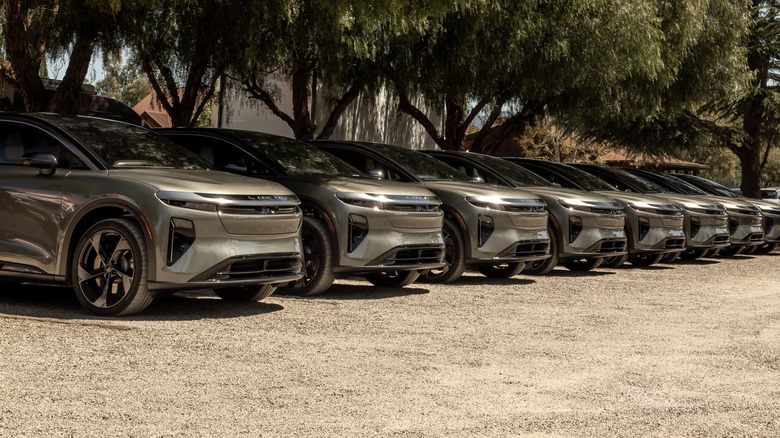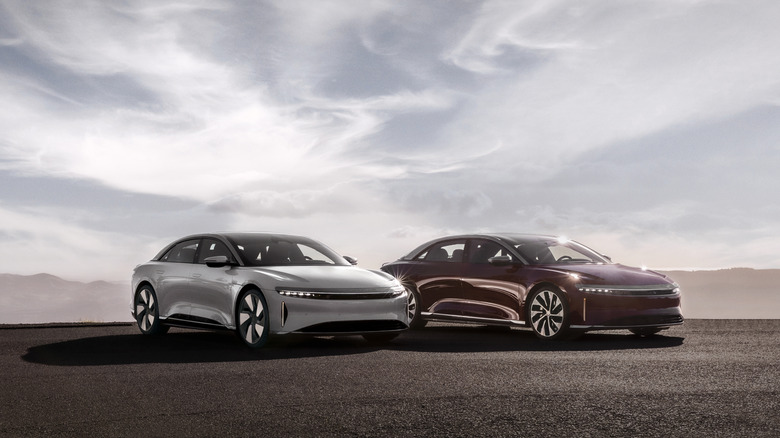Congress is poised to kill off the federal EV tax credit that principally made Tesla into the juggernaut it’s at present. Shockingly, Lucid CEO Marc Winterhoff would love legislators to rethink that. In response to Automotive Information, the chief of a startup that bought simply over 10,000 autos in 2024 and misplaced greater than $3 billion thinks it is unfair that the credit are being yanked after 20 years of benefitting the automakers that beat Lucid to the punch.
As Automotive Information identified, Lucid’s Air sedan is ineligible for the $7,500 federal credit score in the event you purchase the automobile new as a result of it is too costly, however the firm is ready to faucet the credit score through leasing. Sadly, as former CEO Peter Rawlinson famous final yr, Lucid prospects sometimes make an excessive amount of cash to qualify.
Lucid has bought approach, approach lower than the 200,000-vehicle cap on the embattled credit score, so methinks Winterhoff is gazing towards comparatively poorer prospects who would possibly go for cheaper variations of the corporate’s new Gravity SUV, anticipated someday quickly, in addition to the upcoming smaller, cheaper crossover coming subsequent yr.
Lucid is lacking the ugly level
Winterhoff’s attraction to equity could be form of charming if it did not make him look utterly delusional about what the Massive, Stunning Invoice now awaiting Senate approval — after which President Trump’s large, lovely Sharpie signature to turn into the Massive, Stunning Legislation — is all about. Jack Sheldon, who sang the well-known “I am Only a Invoice” track for “Schoolhouse Rock” and died in 2020, is definitely handing over his grave.
You wish to seize Winterhoff by his ex-management guide lapels and shake the person, who took over from Rawlinson in February. The Republican-controlled Congress is not focused on nurturing EV startups. As Automotive Information reported, the Senate would utterly obliterate the prevailing tax credit in six months (the Home invoice retains them round by way of 2026). One might fairly assume that GOP legislators are telling Winterhoff and all people else within the struggling EV startup enterprise that they need to recover from it.
Not what Winterhoff desires to listen to, therefore the pushback. Lucid is infamously backed by the Saudi sovereign wealth fund, however its inventory has tanked nearly 80% since a peak of $58 in 2021. It trades barely greater than $2 at present — half what the most cost effective Massive Mac in America prices in Austin, Texas.
Getting wealthy folks to subsidize EVs was truly an awesome concept
Winterhoff is pleading for an incentive that had already been modified by the Biden administration when the tax credit had been tweaked to favor U.S. automakers and restrict the affect of Chinese language battery suppliers. Biden additionally wished to take the credit away from their pure constituency, wealthy individuals who might truly use a $7,500 discount to their tax payments. (In 2024, it was adjusted to be a point-of-sale credit score, administered by sellers, making it simpler for on a regular basis Joe’s to entry it.)
Again within the day, when the credit had been primarily being tapped by Tesla homeowners, there was one thing sensible about tempting patrons flush with money from “fairness occasions” or simply gigantic Silicon Valley salaries spend large cash for an EV in alternate for Uncle Sam relieving them of taxes they may most likely simply afford. Proper earlier than the yr ends, purchase a Mannequin X! Your accountant rejoiced. Name it tax-credit harvesting.
All the EV market within the U.S. was bolstered by this coverage. Tesla will surely not be a $1-trillion enterprise with out it. Nevertheless it additionally meant that startups might deal with dear, extra worthwhile vehicles quite than reasonably priced fashions. That was an excellent factor when the EV enterprise was studying to crawl, however it will definitely turned a political soccer. Winterhoff’s calculated help of truthful play is unsurprising, however the backside line is that EV tax credit had been by no means precisely truthful to start with.




